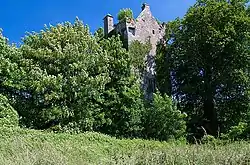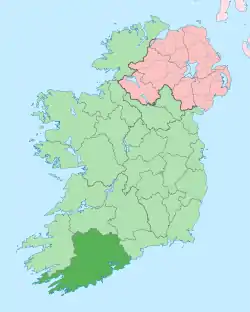Ballyclogh, County Cork
Ballyclogh[2] or Ballyclough (Irish: Baile Cloch, meaning "town of the stones")[2] is a small village 8 km outside Mallow, County Cork, Ireland. The name Ballyclogh has its origins in the past abundance of stone quarries in the area. Ballyclogh is part of the Cork East Dáil constituency.
Ballyclogh
Baile Cloch | |
|---|---|
Village | |
 Ballyclogh tower house | |
 Ballyclogh Location in Ireland | |
| Coordinates: 52°10′03″N 08°44′35″W | |
| Country | Ireland |
| Province | Munster |
| County | County Cork |
| Population (2016)[1] | 259 |
The village has a tower house, built by the Barry family (or Mac Robert-Barry).[3] In 1641 it was forfeit to the Purdon family, and then, in 1691, surrendered to the Williamites. It was renovated during the 19th century, but is now in ruins.[4]
The village today has two public houses, a local grocer, a community centre, playground, funeral chapel and Catholic church. Ballyclogh has a rich history of farming; Ballyclogh Creamery was founded in the early 1900s and grew to join forces with Mitchelstown Co-op to form Dairygold Co-Op.[5]
Major-General Henry Green Barry, the father of the famous jurist Sir Redmond Barry (1813–1880), Q.C., was from Ballyclogh. Sir Redmond, who became a leading judge in the Colony of Victoria, was the presiding judge at the final trial of Ned Kelly in Melbourne. Barry Yelverton, 1st Viscount Avonmore, though born in Kanturk, had close links to Ballyclogh through his mother, Elizabeth Barry.
The Rev Samuel Hayman (1818–1886) noted that when first mentioned in 1291 it was called "Labane" – meaning the "fair district", and acquired the name Ballyclogh when the local castle was built by the Barry family in 1591.
Another 19th-century antiquarian, the Rev JF Lynch, wrote that "Ballyclogh is named Lathbán in taxation of 1302, and in taxation of 1306 is named Lachbán, and this 'Lathbán' or 'Lachbán' is given as 'Lavan' by Lewis, who names this parish 'Ballyclough or Lavan.'"[6] An area close to village centre still goes by the name 'Lachbán' - (pronounced Ly-bawn), just west of the 'Smithfield' area and approximately 400 meters from the castle.
References
- "Census 2016 Sapmap Area - Settlements - Ballyclogh". CSO. 2016. Retrieved 18 August 2018.
- Ballyclogh/Baile Cloch. Placenames Database of Ireland. Retrieved 19 April 2014.
- Lewis, Samuel (1837). "BALLYCLOUGH, or LAVAN, a parish - from A Topographical Dictionary of Ireland". Library Ireland. Retrieved 2011-10-28.
- "Irish Castles - Ballyclogh Castle". Castle Travel Guide. Archived from the original on 2012-06-20. Retrieved 2011-10-28.
- Ballyclogh Co-op. A History.
- James Grove White, ed. (1901). "Historical and topographical notes, etc on Buttevant, Castletownroche, Doneraile, Mallow, and places in their vicinity". Guy & Co, Cork. p. 126.
